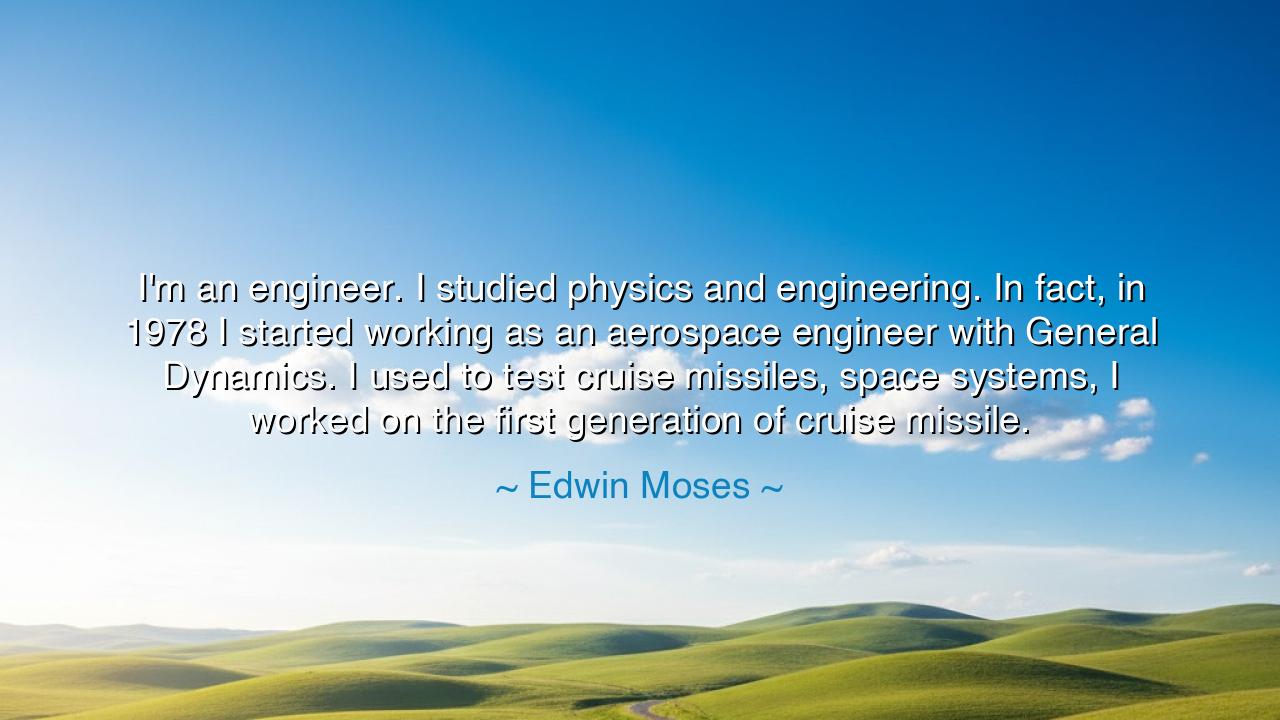
I'm an engineer. I studied physics and engineering. In fact, in
I'm an engineer. I studied physics and engineering. In fact, in 1978 I started working as an aerospace engineer with General Dynamics. I used to test cruise missiles, space systems, I worked on the first generation of cruise missile.






In the vast tapestry of human achievement, there are those who dedicate their lives to shaping the world through their mastery of science, engineering, and innovation. Edwin Moses, in his words, reflects a profound journey into the realm of technology and discovery: "I’m an engineer. I studied physics and engineering. In fact, in 1978 I started working as an aerospace engineer with General Dynamics. I used to test cruise missiles, space systems, and I worked on the first generation of cruise missile." Moses' statement is a declaration of his devotion to the art of engineering—a craft that has, for centuries, propelled humanity from the confines of the earth to the stars.
In the ancient world, the engineers and mathematicians were revered as those who bridged the gap between theoretical knowledge and practical application. Archimedes, one of the greatest minds of antiquity, was both a philosopher and an inventor. His understanding of the natural world allowed him to develop technologies that were ahead of his time, such as the famous Archimedean screw, used for lifting water. Like Archimedes, Moses represents the modern embodiment of the engineer, the individual who dedicates themselves not just to learning, but to creating, to bringing the wonders of science into the real world, using knowledge to advance the future.
To understand the magnitude of Moses' work, consider the aerospace industry’s history, a field that has always stood at the cutting edge of human imagination and innovation. The cruise missile, a device that Moses worked on, is an invention that shaped both military strategy and the technological progress of nations. Its development marked a turning point in the capabilities of human engineering. Just as the ancient warriors once relied on the technology of their time—be it the catapult or the siege tower—the engineers like Moses were responsible for shaping the modern arsenal that would define the power dynamics of the 20th century. In this, Moses follows in the footsteps of those ancient masters who brought their societies to greatness through their innovations.
Yet, with such power and knowledge comes great responsibility. As Edwin Moses reflects on his role in testing and creating such technological marvels, we are reminded that the mind of the engineer is not only about creation but also about the moral choices that come with such creations. The ancient Greeks warned of the dangers of unchecked ambition, of the hubris that could arise from the power that technology grants. In their myths, such as the story of Prometheus, who stole fire from the gods to give it to humanity, we see both the gift of knowledge and the curse of recklessness. For as much as science can advance society, it must always be tempered with wisdom—wisdom to know when to wield its power and when to step back.
As Moses shares his journey in the world of aerospace engineering, we are reminded of the human spirit’s quest to conquer the unknown. It is a heroic pursuit, one that carries with it both hope and danger. Consider the example of the Apollo 11 mission, which brought humans to the moon for the first time in 1969. That monumental achievement, which stands as a testament to the brilliance of human engineering, was also a profound risk, as each step taken by the astronauts was a journey into the unknown. The very act of launching into space, like Moses’ work with cruise missiles, was a demonstration of mankind’s insatiable desire to explore, to push beyond the known boundaries of the earth.
The lesson we must take from Edwin Moses's experience as an engineer is the balance between knowledge and responsibility. The ancient philosophers emphasized the importance of wisdom, that it was not enough to know or to create—one must also understand the implications of their work. Moses’ reflection on his work with cruise missiles is a call to recognize that the role of the engineer is not only to build and test, but to deeply consider the consequences of their creations. Just as Prometheus’s gift was both wondrous and dangerous, so too is the work of modern engineers: it is a gift to humanity, but it must be handled with the utmost care.
Let us, therefore, reflect on this profound truth: that the work of the engineer, the scientist, and the creator is a great gift to humanity, but it comes with the heavy burden of ensuring that the technologies we develop serve the greater good and not the forces of destruction. As we move forward into new realms of discovery and innovation, we must always hold fast to the lessons of wisdom passed down from the ancients—that knowledge, when used without a sense of responsibility, can lead not to progress, but to ruin. May we always use our knowledge to build a future that is filled with hope, peace, and harmony, rather than one marred by the unchecked forces of ambition.






AAdministratorAdministrator
Welcome, honored guests. Please leave a comment, we will respond soon